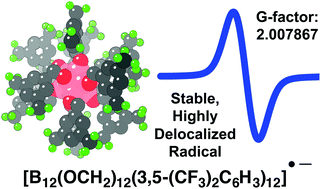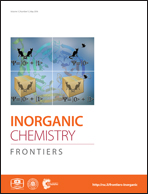Rapid synthesis of redox-active dodecaborane B12(OR)12 clusters under ambient conditions†
Abstract
We have developed a fast and efficient route to obtain perfunctionalized ether-linked alkyl and benzyl derivatives of the closo-[B12(OH)12]2− icosahedral dodecaborate cluster via microwave-assisted synthesis. These icosahedral boron clusters exhibit three-dimensional delocalization of the cage-bonding electrons, tunable photophysical properties, and a high degree of stability in air in both the solid state and in solution. A series of closo-[B12(OR)12]2−, hypocloso-[B12(OR)12]1− and hypercloso-[B12(OR)12]0 clusters have been prepared with reaction times ranging from hours to several minutes. This method is superior to previously reported protocols since it dramatically decreases the reaction times required and eliminates the need for inert atmosphere conditions. The generality of the new microwave-based method has been further demonstrated through the synthesis of several new derivatives, which feature redox potentials up to 0.6 V more positive than previously known B12(OR)12 cluster compounds. We further show how this method can be applied to a one-pot synthesis of hybrid, vertex-differentiated species B12(OR)11(OR′) that was formerly accessible only via multi-step reaction sequence.

- This article is part of the themed collection: 2015 Emerging Investigators by ICF

 Please wait while we load your content...
Please wait while we load your content...